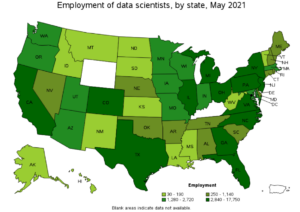When you’re looking to land a good job in the field of data science, whether you’re a fresher, a career changer, or an experienced candidate, there’s usually a lot on your mind.
And although the job search phase initially looks intimidating and exhausting, there has never been a better time to become a data scientist.
According to one recent report released by the US Bureau of Labor Statistics, data scientists are currently in the top 20 fastest-growing occupations in the U.S. with 31% projected growth over the next 10 years, and about 11.5 million new jobs in the field by 2026.

So then, how exactly can data science candidates leverage this increase in demand to their favor?
The answer is simple! By targeting the right position — this will help you narrow down your search and figure out what skills you most need to attract good job openings in the market.
How to Choose the Right Data Science Position?
Data science roles have grown over 650% since 2012, as per one recent article published by LinkedIn.
Today, there are a number of data science profiles to choose from. All of them are critical to making important business decisions. Often, several of the job types work together on the same team.
Before we can look at the factors you should be considering to choose the right data science position, let us first get to know about a few skills that are in high demand within the niche today. Learning this will increase your chances of landing a good data science position by manifolds.
Data Science Skills in Demand:
Here’s a list of the seven most in demand data science skills that will help you target the position of your choice:
- Statistical analysis – Being familiar with various elements of statistical analysis such as probability, distribution curves, standard deviation, variance, etc. helps place you in a better position than your counterparts.
- Knowledge of Linear Algebra and Multivariable Calculus – Being able to apply mathematical concepts to understand and augment the the fitting functions that match a model to a data set is invaluable. If not done correctly, the model won’t be able to derive accurate predictions.
- Coding and Programming Expertise – Nearly 5% of all data science and data analytics jobs can be found in IT (information technology) and other related professional services. Therefore, if you want to land a good data science position with a good company, it is important that you learn at least a few commonly used programming languages.
- Predictive Modeling – Being able to use data to model different outcomes and scenarios, and make predictions on the basis of commonly observed patterns, is a central part of most data science positions. Therefore, predictive modeling is another important area data science enthusiasts should learn about.
- Machine Learning – While it is a known fact that data scientists don’t necessarily need to work with artificial intelligence (AI) technologies and applications, they’re being hired by a lot of companies to implement machine learning applications these days. Skills in deep learning, a more advanced method that uses neural networks to create complex analytical models, particularly help data scientists stand out.
- Data Visualization – Being able to visualize data effectively when presenting analytics results, especially when working with sets of big data that are large and contain different data types, is another important data science skill to have on your resume if you want to attract top companies.
- Data Wrangling and Preparation – Most data scientists spend only 20% of their time on actual data analysis and 80% of their time finding, cleaning, and reorganizing huge amounts of data. To aid in those efforts, data scientists should be familiar with using common data warehouse and data lake environments, including both relational and NoSQL databases and big data platforms such as Apache Spark and Hadoop.
Data Science Job Titles in Demand:
1) Data Scientist
Data scientists build models using programming languages such as Python. They then transform these models into applications.
Often working as part of a team, for example, with a business analyst, a data engineer, and a data (or IT) architect, they help solve complex problems by analyzing data and making predictions about the future. This role is typically considered an advanced version of a data analyst.
Average Salary in the US – $99,138
Commonly Required Skills – Mathematics, statistics, programming skills, machine and deep learning, big data processes, data analysis, knowledge of tools such as SQL, Hadoop, etc.
Educational Qualifications – Bachelor’s degree in a related field, although increasingly data science bootcamps, master’s programs, and professional certificates can help career switchers reach their goals.
According to a recent study of data scientists and salaries, more than 94 percent of data scientists held a master’s or doctorate degree.
2) Data Analyst
Data analysts, unlike data scientists, use structured data to solve business problems. Using tools such as SQL, Python, and R, statistical analysis, and data visualization, data analysts acquire, clean, and reorganize data for analysis to spot trends that can be turned into business insights. They tend to bridge the gap between data scientists and business analysts.
Average Salary in the US – $63,344
Commonly Required Skills – Programming languages (Python, R, SQL, SAS), data visualization, statistics and math
Educational Qualifications – Bachelor’s degree in computer science, mathematics, statistics, finance, or a related field.
3) Data Architect
Data architects create the blueprints for data management systems, designing plans to integrate and maintain all types of data sources. They oversee the underlying processes and infrastructure. Their main goal is to enable employees to gain access to information when they need it.
Average Salary in the US – $115,196
Commonly Required Skills – Data mining and management, coding languages such as Python and Java, machine learning, data modeling, and SQL
Educational Qualifications – A bachelor’s degree in data, computer science, or a related field. If you are switching careers, a bootcamp or professional certificate can help develop your skills in data management.
4) Data Engineer
Data engineers prepare and manage large amounts of data. They also develop and optimize data pipelines and infrastructure, getting the data ready for data scientists and business analysts to work with. Data Engineers make the data accessible so businesses can optimize their performance.
Average Salary in the US – $97,727
Commonly Required Skills – Understanding of NoSQL databases (MongoDB), and frameworks like Apache Hadoop, knowledge of programming languages such as Java
Educational Qualifications – A bachelor’s degree in math, science, or a business-related field is helpful. Professional certificates and bootcamps are also an option to brush up on skills
5) Machine Learning Engineer
This role is not an entry-level position, but one you can build toward as a data scientist or engineer.
Machine learning uses algorithms that replicate how humans learn and act, to interpret data and build accuracy over time. As part of a data science team, machine learning engineers research, build, and design artificial intelligence that facilitates machine learning. They also serve as a liaison between data scientists, data architects, and more.
Average Salary in the US – $100,066
Commonly Required Skills – Knowledge of tools such as Hadoop, Spark, Apache Kafka, R, Google Cloud Machine Learning Engine, Tensorflow, and more. An understanding of quantitative analysis, data structures and modeling, and computer science basics, is also helpful
Educational Qualifications – Often a master’s degree or even a Ph.D in computer science or related fields is expected. Gain an introduction to this field by enrolling in one of Coursera’s most popular courses, Machine Learning.
6) Business Analyst
As a business analyst, you’ll use data to form business insights and make recommendations for companies and organizations to improve their systems and processes. Business analysts identify issues in any part of the organization, including staff development and organizational structures, so that businesses can increase efficiency and cut costs.
Average Salary in the US – $74,366
Commonly Required Skills – Using SQL and Excel, financial modeling, data visualization, business acumen, data and financial analysis
Educational Qualifications – Bachelor’s degree in finance, economics, computer science, business, statistics, or a related field
Now that you know about some of the most in-demand data science skills and common job titles available today in the niche, let us finally take a look at –
Choosing the Right Data Science Position:
While it is true that every individual is different and your interests play a crucial role in deciding which company and data science position you choose, we’ll take a more objective approach here and provide suggestions that’ll help you choose a position solely on the basis of your background.
1) If You’re a Data Scientist with a Couple Years of Experience
Say you’re already a data scientist with a few years of experience and are looking for a job either because you want to work in a different field, or because you want to switch to a different company.
In such a case, all types of data science roles would be ideal for you. All you need to do is demonstrate relevant industry experience and show your potential employer why you’re a good fit for their organization, even from a company culture perspective.
2) If You’re Employed with a Startup and Want to Advance to Bigger Companies
In this scenario, the position that you land will largely depend on your existing experience and skillset.
Say, for example, you have been working in a startup on the analytics track for 3 years. If you want to continue on the same track but switch to a bigger public company such as Meta or Google, you would have a very high chance of landing interviews because you have the exact experience they are looking for.
Now consider a second scenario where you want to change to the machine learning track from your existing analytics track. You still have a high chance of landing a good job position if you have first-hand experience/can demonstrate that you have been an active part of projects related to machine learning.
3) If You’re a Fresh Graduate
In this case, the right type of position will really depend on the coursework you have done.
Generally speaking, if you majored in statistics or you have taken many statistics courses, or if you graduated from the business school but have taken courses related to quantitative analysis, then the data scientist analytics track may be the best choice for you.
On the other hand, if you majored in computer science or have taken extensive coding and machine learning courses, then the data science, algorithms/machine learning roles are probably the best for you.
4) If You’re Wanting to Switch Careers and Pivot to Data Science
In this case, it’ll help to focus on the analytic-driven roles.
There are two reasons for this —
- the number of openings for analytics track is the highest.
- since you already have some experience in the industry, product knowledge and business metrics may become very intuitive for you, which is a key requirement for the analytics track. This would make your transition much smoother.
You can also go for an algorithm driven position if you have a passion for Machine Learning, and you have taken the time to build your foundation in coding.
That’s a wrap!
To learn more about how you can increase your chances of getting noticed by the best companies and land the data science position you’ve been eyeing, get in touch with us at BenchPoint today!
We’ll be happy to guide you in your job search and help you build a strong background in the process of doing so.
